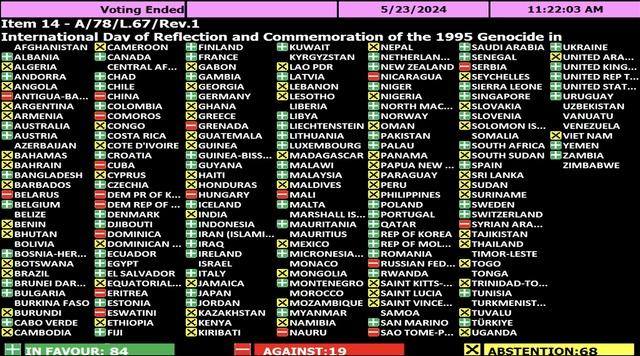A session was held at the UN General Assembly for voting. The session started with a minute of silence for the deceased Iranian President Ibrahim Reisi and his accompanying officials. Speaking before the vote, Serbian President Aleksandar Vucic argued that the draft resolution was “too political.”
Stating that individual culprits related to the incident were punished, Vucic stated that the draft resolution will neither contribute to stability and unity in Bosnia-Herzegovina nor in the region, on the contrary, it will increase divisions.
Vucic accused Germany of threatening countries that do not support the draft resolution and said, “Are these the values of Europe?” posed the question.
DRAFT DECISION
The draft resolution, submitted by Germany and Rwanda and co-presented by more than 40 countries as well as Turkey, was accepted with 84 “yes” votes in the 193-member UN General Assembly.
The bill received 68 “abstain” and 19 “no” votes.
The resolution condemned the denial of the Srebrenica Genocide and the glorification of crimes against humanity, genocide and war criminals.
The decision underlined the importance of continuing efforts to identify the victims of the genocide and reach their bodies, and called for the continuation of the prosecution of those responsible for the Srebrenica Genocide who have not yet been tried.
In the decision, it was decided that July 11 every year would be the “Srebrenica Genocide Remembrance Day”, and it was requested that this day include activities that would both commemorate the victims and increase awareness and education.
The decision emphasized that no ethnic, religious or other group or society was targeted in accordance with international law when punishing genocide criminals, and pointed out the importance of the rule of international law.
Each country has one vote in the UN General Assembly. Unlike the UN Security Council, no country has veto power.
Although not binding, General Assembly resolutions have political weight and send a strong message to the international community.
SERBS AND RUSSIANS OPPOSED
Serbian President Vucic, in his statement on March 29, argued that the main purpose of the bill was to punish the Serbian people for their liberal and independent policy and to subject them to additional pressure on Kosovo.
Milorad Dodik, President of the Republika Srpska (RS), one of the two entities in Bosnia and Herzegovina, said: “What happened there was a crime that occurred after the fatigue, hatred and pain of the war, but it was not genocide. There was no genocide in Srebrenica, this ‘horrible word’ is not ours, it is our children’s and grandchildren’s.” It is a word that is intended to be put on one’s back.” He made a statement.
Dodik had said that if a decision was taken at the UN General Assembly regarding the Srebrenica genocide, RS officials would gather in Srebrenica and show that this place “belongs to them”.
Serbian National Assembly Speaker Ana Brnabic also stated that Serbia would oppose such actions at the UN.
Russia’s Permanent Representative to the UN, Vassily Nebenzia, claimed that the bill addressed the issue “one-sidedly”.
WHAT HAPPENED IN SREBRENITSA?
Immediately after the occupation of Srebrenica by Serbian troops under the command of Ratko Mladic on July 11, 1995, civilian Bosnians who took shelter with Dutch soldiers under the UN were handed over to the Serbs.
Serbs, who allowed women and children to go to the area controlled by Bosnian soldiers, killed at least 8,372 Bosnian men in forest areas, factories and warehouses, and the murdered people were buried in mass graves.
In its 2007 decision, the International Court of Justice in The Hague described what happened in Srebrenica and its surroundings as “genocide”, in line with evidence from the International Criminal Tribunal for the Former Yugoslavia (ICTY).
There are more than 1600 people who lost their lives in the genocide in Srebrenica, whose identities could not be determined and whose bodies could not be reached. (AA)

